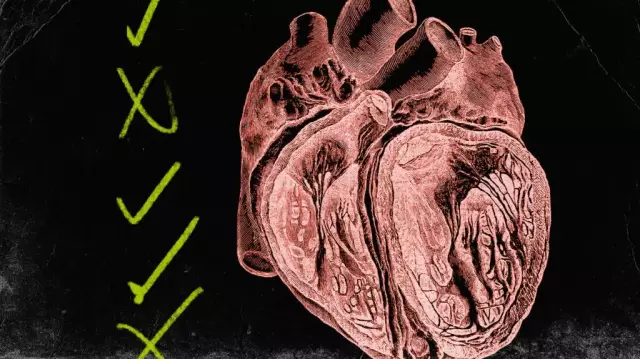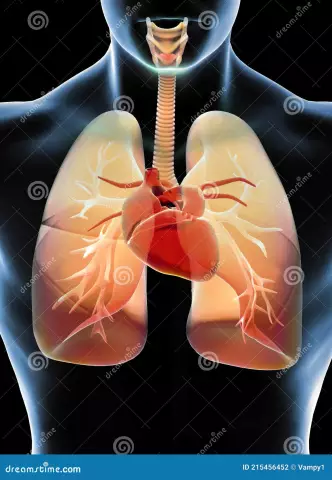- Author Curtis Blomfield blomfield@medicinehelpful.com.
- Public 2023-12-16 20:44.
- Last modified 2025-01-23 17:01.
Heart failure as a combination of disorders associated with the deterioration of the contractile functions of the heart muscle is a dangerous pathology for humans. The result of this condition is a deficiency in the supply of nutrients and oxygen to the myocardium, which affects the work of all internal organs and systems, and the well-being of a person. Heart failure of varying degrees occurs in both men and women. The disease can lead to irreversible complications, including the death of the patient due to ineffective or late medical care.
Ignoring the symptoms of heart failure is a guarantee of inevitable deterioration in he alth. That is why, when the first alarming “bells” of this life-threatening disease appear, it is necessary to rush to an appointment with a cardiologist. Only a specialist will be able to make an accurate diagnosis, establish the cause and draw up a competent therapy. In addition, the doctor will give the necessary recommendations and instructions on how tostop a heart attack at home.
Acute form of pathology
The first symptoms of heart failure often indicate a complication of a severe form of arrhythmia, among the common types of which it is worth noting paroxysmal tachycardia, ventricular fibrillation. The acute form of the disease can also result from myocarditis or infarction. As the ability of the heart muscle to contract normally decreases, the volume of blood entering the arterial system decreases every minute.

Acute heart failure is often caused by a decrease in the pumping function of one or both ventricles, the left atrium. Again, the chances of developing the disease are increased by myocardial infarction, the presence of aortic defect, and frequent hypertensive crises. A decrease in the contractile functions of the atrium or at least one of the ventricles leads to an increase in blood pressure, an increase in the permeability of the vascular walls. This phenomenon, in turn, becomes a provoking factor in the edema of the lung tissue. Acute heart failure in terms of symptoms is almost identical to the manifestations of acute vascular insufficiency, this condition is called collapse by doctors.
Description of the chronic course of the disease
Unlike the acute variety, the chronic one develops gradually, which is associated with the body's compensatory capabilities. The disease begins with an increase in the rhythm of heart beats and an increase in their intensity. On the backgroundarrhythmic manifestations, arterioles and capillaries expand. This, in turn, contributes to the smooth emptying of the chambers and the improvement of muscle tissue perfusion.
As the disease progresses and compensatory mechanisms are exhausted, cardiac output steadily decreases. The ventricles are no longer able to completely empty and remain overflowing with blood during the period of diastole. The myocardium in chronic heart failure tries to move the stagnant blood in the ventricles into the arterial circulation. However, this does not give the desired result, and therefore becomes a favorable condition for the formation of compensatory hypertrophy of the heart muscle. In the future, the myocardium will only become weaker due to the dystrophic and sclerotic processes occurring in it. Their cause is a lack of blood supply and oxygen, nutrients and energy supplied to the tissues.

The next stage in the development of chronic heart failure is the stage of decompensation. To maintain the level of normal hemodynamics, the body turns to the neurohumoral mechanisms of the sympathetic-adrenal system. A relatively stable level of blood pressure is ensured precisely due to their activation, despite the significantly reduced cardiac output. Usually, this process is accompanied by a spasm of the kidney vessels, which leads to ischemia of the organ and the development of their dysfunction with retention of interstitial fluids.
Further, the production of antidiuretic hormone by the pituitary gland, which affectson the mechanism of water retention in the body. As a result, an increase in the volume of circulating blood, an increase in blood pressure, leakage of fluid into the interstitial space.
Chronic heart failure occurs on average in 2% of the population. In old age, the likelihood of developing the disease increases, and among 70-year-old people, one in ten is diagnosed with an illness. In fact, heart failure is a serious medical and social problem, as pathology often leads to death or disability.
Heart disease as the main cause
It is impossible to answer unambiguously the question of what leads to the development of heart failure. First of all, the risk increases the presence of diseases of the heart and blood vessels, in particular:
- congenital heart disease;
- hypertension;
- postponed myocardial infarction;
- atrial fibrillation;
- expansion of cardiac cavities;
- inflammation of the heart muscle;
- cardiopathy;
- ischemic disease;
- myocardiopathy in alcohol withdrawal.
Inflammatory and infectious diseases
Heart failure often occurs as a result of infectious diseases, accompanied by a dangerous inflammatory process in the body. By the way, this reason is the most common in childhood. Heart failure may result from:
- flu;
- polio;
- pneumonia;
- scarlet fever;
- diphtheria;
- angina.
As a rule, this chronic heart disease has a long path of development, but it is important to know that it can manifest itself at any time with an acute attack. Every person with impaired functioning of the heart and blood vessels should have information about how to stop it.

How to understand that a person has heart disease
Specific signs of heart failure include specific clinical manifestations. The most common ones are:
- Shortness of breath that gets worse even with minimal exertion. In the later stages of the development of the disease, it occurs not only with stress, but also at rest and even during sleep.
- Permanent weakness and fatigue. This inevitably affects labor productivity, reduced efficiency.
- Chronic cough and tachycardia.
- Edema. The mechanism of fluid accumulation in tissues has been described above. This symptom is manifested due to a lack of oxygen, which the heart muscle is trying to make up for due to its intense contraction, and, consequently, an increase in heart rate.
- Hypotension.
- Obesity of a visceral nature (subcutaneous fat accumulates mainly in the peritoneum).
- Ascites is the concentration of excess fluid in the abdomen.
- Cyanosis is a pathological condition that is manifested by cyanosis and pallor of the skin.
Also, in first-degree heart failureangina pectoris may appear - acute pain in the sternum. It is almost impossible to cure this disease forever, but it is up to the doctor and the patient to eliminate the symptoms that prevent a full life. It will be possible to achieve stable remission with complex therapy.
Stages of disease progression
The considered pathology of the heart is classified by physicians mainly according to the severity of the manifestation and the reaction of the patient's body to physical activity. You can understand what it is, heart failure of the 1st degree, by the slight shortness of breath that occurs while climbing stairs. Meanwhile, physical activity of a different kind does not affect the patient's well-being. The prognosis for heart failure 1 degree is the most favorable. The main thing is to monitor your he alth and prevent the progression of the disease. As such, no treatment is needed for grade 1 heart failure.

Second degree heart failure affects work activity. At this stage of the development of the pathology, rapid fatigue appears, the pulse quickens, breathing becomes difficult. Symptoms disappear without a trace at rest. The third and fourth degrees of severity of the disease occur with symptoms that can be traced even with minimal physical activity of the patient and remain in a calm position.
Conservative Therapy, Drug List
As a rule, doctors do not resort to medical treatment of heart failure of the 1st degree. Recommendationsspecialists for such patients are reduced to a revision of the lifestyle and daily routine. In order to prevent the development of the disease, the patient must avoid stress, heavy physical exertion, eat a balanced diet, have a good rest and, of course, completely abandon bad habits. If necessary, prescribe sedatives and antidepressants.

The second degree of heart failure is an indication for taking medications that support the work of a weakened muscle. Conservative therapy involves taking a whole range of drugs:
- Cardiac glycosides ("Digitoxin", "Methyldigoxin", "Digoxin", "Strophanthin K"). They are prescribed to the patient to improve the contractile function of the myocardium.
- Nitrates ("Nitroglycerin"). Stop pain attacks in the chest, expand the veins.
- ACE inhibitors (Captopril, Captopress, Lisinopril, Fosinopril). Medicines in this group reduce blood pressure, dilate blood vessels, reducing the risk of cardiac arrest.
- Beta-blockers ("Metoprolol", "Atenolol"). Indicated for arrhythmia and tachycardia, slow heart rate and lower blood pressure.
- Calcium antagonists ("Verapamil", "Cinnarizine", "Diltiazem", "Amlodipine", "Nitrendipine"). Needed to dilate blood vessels, eliminate arrhythmias.
- Diuretics ("Spironol", "Urakton", "Furosemide", "Aldactone"). Medicines of this group accelerate the removal of excess fluid from the body, preventing the formation of edema. Diuretics increase the effectiveness of drugs that reducepressure.
Heart surgery
In congenital cardiovascular insufficiency, the use of drugs, unfortunately, is insufficient to stop the progression of the disease. As a rule, drugs help only temporarily stop the manifestations of the disease, but do not eliminate the provoking factor. In fact, the symptoms of heart failure are only evidence of its effects.

In severe cases, the cardiologist may decide that surgery is necessary. The type of surgical treatment will depend on the type of heart failure:
- For heart valve defects, prostheses are installed.
- Stenosis is a direct indication for arterial stenting, during which a special expanding frame is placed inside the vessel.
- When the ductus arteriosus is open, an occluder is placed.
- Catheter ablation of the pathways is performed for WPW- and LGL-syndrome.
Organ transplant
Indications for heart surgery are severe symptoms of heart failure and a severe life-threatening condition. In such cases, the disease is not always treatable, which means that, due to structural changes in the organ, its transplantation may be necessary. A successful transplant of a he althy heart will allow a person to live a full life, but one should not forget about the high mortality rate. On average, about 10% of patients die during the operation and within the first month after it. Mainthe reason is the rejection of the donor heart due to the body's immune response.
Advice to patients
Any of the signs of heart failure above are red flags that your lifestyle needs urgent adjustment. First of all, you need to give up bad habits, if any. The prognosis of life with heart failure of the 1st degree leaves hope for a happy future, however, in order for the disease not to develop further, you will have to reconsider your diet.

The diet of a person with heart disease should be dominated by fresh vegetables and fruits (especially apricots and persimmons), fermented milk drinks and cottage cheese, lean meats and fish, boiled potatoes, buckwheat, oatmeal. While s alty, fried and pickled dishes are better to be completely excluded. Strong tea and coffee, hot spices, smoked meats and chocolate will not benefit. Alcohol is completely contraindicated in heart failure.
To minimize swelling and reduce the burden on the kidneys, it is better to reduce the daily amount of fluid consumed (no more than 1 liter). Self-medication for heart disease is not the best solution. Do not delay your visit to the doctor. Remember that the prognosis of the disease largely depends on the quality and timeliness of medical care.






